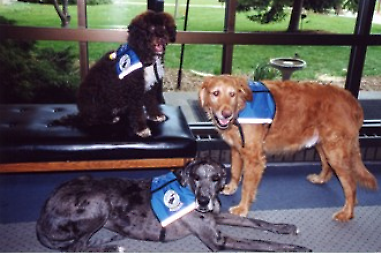Terrilynne Lymburner and Jeanne Lewis founded West Michigan Therapy Dogs, Inc. in 2001. Lymburner is a geriatric psychologist and Lewis is a dog trainer. Both serve the community by volunteering their time and sharing their pets' affection with others in need.
Friends Terrilynne Lymburner and Jeanne Lewis founded West Michigan Therapy Dogs (WMTD) in 2001 after witnessing the therapeutic effects on hospitalized patients during visits with therapy dogs. Lymburner and Lewis realized that more dog/handler teams could be trained and mentored in pet therapy through the creation of an organized effort. They founded WMTD and began to train volunteers how to interact with people in need who enjoy the companionship of animals. They started small, but through the generosity of supporters and over 250 volunteers, WMTD has grown into an organization that touches the lives of hundreds of West Michigan people in a meaningful way.
Service or Therapy Dog?
Though not classified as service dogs, therapy dogs are specially trained to interact with people within various participating community environments. From hospitals and rest homes to schools and libraries, therapy dogs and their handlers have an opportunity to experience a wide diversity of places to visit and people to see.
However, there are restrictions on where therapy dogs may go. By law, therapy dogs cannot go into restaurants or other public places where service dogs are permitted to accompany their poeple in order to assist them. Service-dogs, on the other hand, are specifically trained to assist the person with whom they are matched, while therapy dogs may interact with as many individuals as time and opportunity allows.
The Early Days
Lymburner, whose two Portugese Water Dogs are in the program, has been training volunteers for over seven years on how to interact with various patients suffering from a range of physical and mental disabilities. She remembers how small WMTD was when it started.
“We had three volunteers in the first class I taught in 2003,” Lymburner explained. “Classes can now hold up to 15 teams.” The program has no shortage of volunteers; winter classes are full, and there is a six month waiting list for enrollment into the program.
Participation
Registration to become certified as a handler/therapy dog team requires a pre-screen evaluation of the animal and the handler to determine eligibility to enter into the program. The minimum age for a volunteer is 10 years old. Junior volunteers must be accompanied by an adult until they are 16, at which time they can handle the dogs themselves with parental consent. Lymburner said there were several children actively participating in the program with parents and relatives.
WMTD prepares the dog/handler teams to perform in many locations and situations unfamiliar to most dogs. The training exercises focus on acclimating the dog to unexpected sights and sounds in order to maintain a level temperament under any circumstances.
Upon completion of a successful evaluation, the team is eligible to enroll in a seven week course designed to prepare them for safe interaction with patients.
“Safety is our primary concern for the patients and the animals,” explained Ken De Boer, President of the Board for WMTD, noting that as handler/dog teams seek to advance to higher levels of certification like AAA, AAT and the Delta Society the requirements become more stringent.
Dogs must be at least a year old for acceptance into the program, and must be in good health. WMTD member dogs have strict health and immunization requirements, as members are volunteers, and must meet standards of area healthcare facilities. Dogs fed a raw diet are not eligible as members of WMTD. Breed and size are not a qualifying factor, however, it is preferable for the animal to have successfully achieved the Good Citizen (CGC) Certificate to enable them to succeed within the program.
An Expanding Program
Partnered with over fifty local agencies in the Grand Rapids and surrounding areas, WMTD, in conjunction with the Kent District Libraries (Grandville branch), has also spawned Ruff Readers, a program that encourages children to read to dogs in a relaxed, non-judgmental environment. This program reduces stress and builds confidence in the readers. The program has grown in popularity as its benefits become more widely recognized. Children who encounter difficulty when reading to adults have been known to read flawlessly to one of the canine volunteers.
"The children are less self-conscious reading to the dogs than to adults," Lymburner said.
West Michigan Therapy Dogs recently installed De Boer as president of the board to oversee the program and plan for its growth. When he is not busy running his company Barkbusters, a company that trains dogs while showing their owners how to tackle training issues by changing how they perceive their dog's behaviors. De Boer is making plans to accomodate the growing number of volunteers. He expects the role of therapy dogs to increase dramatically in the future.
“I see our organization doubling in membership and facilities in the next five years as people realize the positive reaction between dogs and people,” he said.
An evening visit to a geriatric ward with Terrilynne and her dogs Captain Nemo and Dexter confirms why De Boer has high hopes for the future of WMTD. Throughout the Grand Rapids community, the animals break the monotony of an extended hospital stays, foster confidence and enthusiasm for reading in young students and extend a friendly paw to everyone they meet.
The Rapidian, a program of the 501(c)3 nonprofit Community Media Center, relies on the community’s support to help cover the cost of training reporters and publishing content.
We need your help.
If each of our readers and content creators who values this community platform help support its creation and maintenance, The Rapidian can continue to educate and facilitate a conversation around issues for years to come.
Please support The Rapidian and make a contribution today.


